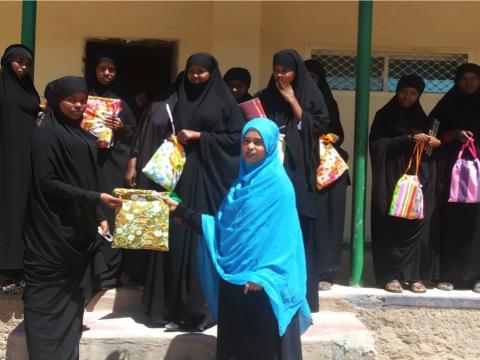Menstrual hygiene rights are human rights. Period.

Sitting in class like most other days, Suad suddenly turns to her classmate in wide eyed amazement. Stifling a giggle, she feels a sense of shocked astonishment about the subject of today’s lesson. While maths is usually the topic of Tuesday morning’s class, today they are discussing menstrual hygiene management and reproductive health.
In Somalia, much like in Australia, menstruation is a taboo topic. In Somalia though, menstruation is considered to be unclean and dirty, especially in rural parts of the country. A lack of menstrual hygiene products and toilets makes girl’s lives even harder. According to UNESCO, one in ten girls in Sub-Saharan Africa miss school while menstruating. Many girls also avoid sport and spending time with their friends.
In Somaliland – a self-declared semi-autonomous state in the North of Somalia – women and girls generally use cloth without underwear to absorb their period. This restricts their movement, with many staying inside throughout menstruation. Lack of bathrooms with clean water, soap and sanitary materials further exacerbates the discomfort of their monthly period and makes it difficult to stay hygienic and retain a sense of dignity.
Empowering women and girls to manage their periods with dignity, is not an issue that women and girls should be left to deal with on their own. Rather, whole communities, policy makers and NGOs should come together to solve these issues in a multifaceted way.
Menstrual Hygiene Management (MHM) involves three key aspects:
- Information and awareness about menstruation and how to manage it with dignity
- Adequate water and safe spaces for women and girls to stay clean during their period
- The ability to dispose of sanitary products cleanly and privately.
UNESCO argues that MHM also involves access to health services, positive social norms regarding menstruation and effective advocacy and policies.
MHM is vitally important as the challenges these women and girls face during menstruation prevent them from realising their human rights, turning a biological fact that almost all women experience, into a barrier to gender equality.
Menstrual hygiene rights are human rights, as the universal declaration of human rights states in its preamble that all human beings should be recognised for their inherent dignity. Without good menstrual hygiene management practices this is impossible for girls. Menstrual hygiene rights are connected to the right to non-discrimination, to health and healthy environment, education and work. The right to health is also at risk, as women using unclean cloths without the ability to wash are at greater risk of developing infections.
Effective Menstrual Hygiene Management is also essential to achieve a number of the Sustainable Development Goals including ensuring healthy lives, inclusive and equitable education, gender equality, clean water and sanitation and inclusive economic growth. Additionally, Menstrual Hygiene Management helps to keep the environment clean through avoiding waste and saving water.
In 2016, World Vision Australia in partnership with Days for Girls, shipped 300 Menstrual Hygiene Kits to Somalia for girls like Suad.
Menstrual hygiene kits include an assortment of items to help girls manage their period, all wrapped up in a colourful drawstring bag.
“This is good because now we don’t have to miss classes because of our periods,” said Suad after learning how to use the kits.
Kits were also distributed at the Hargeisa Rehabilitation Centre in Somaliland, home to some of the most vulnerable young people in the region. Having grown up on the streets, many of these young people experienced neglect and abuse. Those who attend the centre are provided with the care and support that they have been lacking in their day-to-day lives. They also receive education and training that will help to empower them to map out their own future.
While all the young people at the centre have overcome enormous challenges throughout their lives, the young women faced a unique challenge monthly. While living on the streets, menstruation became a nightmare for these girls as they did not have access to a shower, a toilet or the ability to clean their dirty period cloths. This led to an increased risk of these girls developing infections. Once they entered the centre the young women were enthusiastic to manage their periods with dignity, after learning about the Days for Girls kit and attending education sessions.
Menstrual Hygiene Kits support the dignity of women and girls by providing tools to help protect them from infection. The girls are not only shown how to use and properly maintain the kits, they also learn about sanitation and hygiene and sexual and reproductive health including menstruation.
The kits empower these young girls by demonstrating that sanitation and hygiene during menstruation is a matter of human rights and dignity, period.
Activities like these help to challenge some of the existing negative perceptions that surround women’s health issues. It not only helps these women and girls to learn about reproductive health, but also empowers them to make informed decisions about their bodies.
World Vision recognises the importance of MHM. That is why we are moving toward making sure that Menstrual Hygiene Management is always explicitly considered in Water, Sanitation and Hygiene (WASH) programming so that bathrooms constructed at schools and in communities are girl and women friendly, allowing them to continue their lives as normal while menstruating.
In humanitarian emergencies, where getting sanitary supplies can be a challenge, World Vision works to assist affected communities to create sanitary pads from locally available materials. We also work to equip governments, opinion leader’s, parents, and men and boys with technical training so that change can occur at government, community and household level. In this way we work on both the ‘hardware’ side of MHM, but also the ‘software’ side through life skills training for these various groups.
Effectively tackling menstruation taboos and achieving good menstrual hygiene practices in Somalia requires a multifaceted approach. Thank you Days for Girls for your generous donations that are helping girls like Suad.
